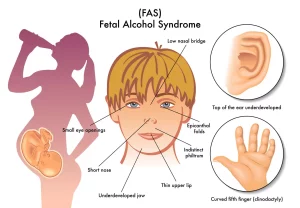What Is Fetal Alcohol Syndrome?
Fetal Alcohol Syndrome (FAS) stands as the most severe manifestation within the spectrum of fetal alcohol disorders. This umbrella term encompasses birth defects arising from maternal alcohol consumption during pregnancy. The impact of FAS and related disorders varies, ranging from mild to severe, affecting children differently.

Fetal Alcohol Syndrome Causes
Alcohol, encompassing wine, beer, and liquor, emerges as the leading preventable cause of birth defects in the United States. The absence of a fully developed fetal liver leaves the developing baby vulnerable to organ damage. This vulnerability can result in complications such as miscarriage, stillbirth, preterm labor, and various birth defects. Crucially, there is no identified “safe” amount of alcohol during any trimester of pregnancy.
Symptoms
The symptoms of Fetal Alcohol Syndrome are diverse and can manifest in various organ systems. It’s essential to recognize these signs, which can range from mild to severe. Symptoms include:
Physical Defects:
- Small head and brain size
- Vision or hearing problems
- Joint, limb, and finger deformities
- Distinctive facial features like small eyes, thin upper lip, and a ridge between the nose and upper lip
Neurological Problems:
- Learning difficulties
- Coordination and balance issues
- Trouble reasoning
- Hyperactivity
- Moodiness
Behavioral Issues:
- Poor social skills
- Difficulty in school
- Poor impulse control

Diagnosis
Diagnosing Fetal Alcohol Syndrome is a complex process, as there is no specific laboratory test for confirmation. The identification involves a thorough examination of physical features, including facial abnormalities, lower-than-average height and weight, small head size, and observable problems with attention and hyperactivity. Additionally, obtaining information about the mother’s alcohol consumption during pregnancy is crucial for a comprehensive diagnosis.
Treatments Options
While there is no cure for the symptoms of Fetal Alcohol Syndrome, early diagnosis and appropriate interventions significantly improve a child’s development and outlook. Treatment approaches include:
- Therapy: Addressing behavioral and educational problems.
- Parental Training: Equipping parents with the skills to support their child effectively.
- Medications: Managing specific symptoms such as hyperactivity, inability to focus, or anxiety.
Complementary therapies like massage, acupuncture, exercise, and yoga may provide additional benefits. Furthermore, addressing maternal alcohol addiction not only prevents FAS in subsequent pregnancies but also enhances parenting skills to support children with FAS.

Complications
Fetal Alcohol Syndrome can lead to various complications later in life, including:
- Depression, anxiety, eating disorders, and other mental health issues
- Alcohol or drug abuse
- Inability to stay in school or finish education
- Problems living independently or with employment
- Attention deficit hyperactivity disorder (ADHD)
- Behavioral issues such as aggression, rule-breaking, and inappropriate social conduct
- Untimely death by suicide, accident, or homicide
Understanding these potential complications is crucial for timely intervention and support.
Prevention
Preventing FAS requires proactive measures:
- Seek help for alcohol problems before pregnancy.
- Avoid alcohol while trying to conceive and throughout pregnancy.
- Consider giving up alcohol entirely if sexually active and having unprotected sex.
Comparative Table: Fetal Alcohol Spectrum Disorders
| Disorder | Description |
|---|---|
| Fetal Alcohol Syndrome (FAS) | Most severe form, affecting various organs and cognitive functions |
| Partial Fetal Alcohol Syndrome | Incomplete symptoms, milder impact compared to FAS |
| Alcohol-Related Birth Defects | Specific organ defects due to prenatal alcohol exposure |
| Alcohol-Related Neurodevelopment Disorder | Neurological issues affecting behavior and cognitive functions |
| Neurobehavioral Disorder Associated with Prenatal Alcohol Exposure | Behavioral problems linked to prenatal alcohol exposure |
Conclusion




